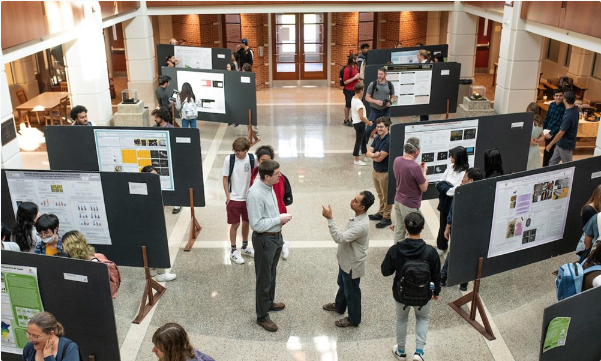Document Type
Poster
Publication Date
Fall 2021
Abstract
Nicotine-use behavior is one of the main causes of preventable diseases such as cancer, cardiovascular diseases, diabetes, and chronic obstructive pulmonary disease. Helping people quit nicotine products is a main goal of our projects. Developing a zebrafish model for nicotine use behavior could provide a tool for studying the underlying genetic, environmental and neuronal elements of nicotine use behavior. The high reproductive rate and short generation time of zebrafish as well as available genetic tools represent major advantages for studying potential links between behavior and genes in zebrafish. In our experiments, we use a behavioral assay for studying nicotine-choice behavior in larval zebrafish. By analyzing the swimming path using the tracking software EthovisionXT (Noldus) we can group larval zebrafish into nicotine-seekers, nicotineavoiders and nicotine-neutrals. As previously shown, about 20% of tested larval zebrafish can be identified as nicotine seekers. By selected breeding we aim to generate a zebrafish line with a higher percentage of nicotine-seekers. However, the results of breeding nicotine-seekers with each other resulted in a smaller percentage of nicotineseeking larval zebrafish in the third generation. Consistently, the percentage of nicotineavoiders is higher in each generation. To explore if nicotine-seeking and avoidance behavior can be linked to gene variants similar to those in humans, we have developed a protocol for detecting variants of nicotinic acetylcholine receptor genes in nicotineseekers and avoiders and found only weak correlation of certain variants with nicotineseeking behavior.
Recommended Citation
Chinyanya, Kuzivakwashe; Button, Andrew; and Schneider, Henning PhD, "Behavior and Genomics of Nicotine-Seeking Larval Zebrafish" (2021). Annual Student Research Poster Session. 56, Scholarly and Creative Work from DePauw University.
https://scholarship.depauw.edu/srfposters/56



Comments
We thank the Buehler Family Foundation, A.C. Buehler ‘78, and Buehler Smith for the generous support. Summer Research stipends were provided by Steven S. Clark Endowed Fund for Student-Faculty Environmental Research (KC), Science Research Fellows Program (AB), Martha C. Rieth Faculty Fellowship (HS) and the DePauw Faculty Development Program (HS). Research was carried out at DePauw University following approved IACUC protocols.